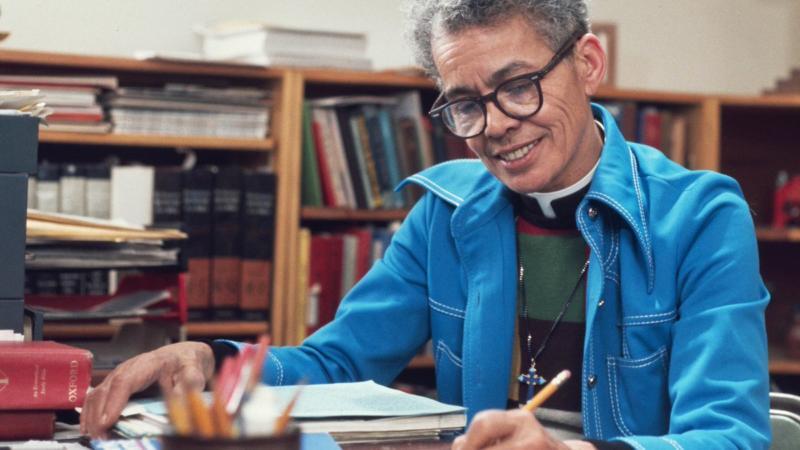This film was screened as a part of the 2021 Sundance Film Festival.
Many Black Americans’ contributions to this country have been erased, buried, or stamped out of the history books. Influential figures like Thurgood Marshall and Dr. Martin Luther King Jr., whose legacies have outlived them, remain pillars — but they were not the only history makers. They often weren’t even the first. Though their name is still not well known, Dr. Pauli Murray was an activist, lawyer, poet, and priest whose fight against racism and segregation in the 1930s and 1940s paved the way for the Civil Rights Movements of the 1950s and 1960s. Moreover, Murray’s term paper at Howard Law became a blueprint for 1955’s Brown V. Board of Education, and the late Ruth Bader Ginsburg credited Murray’s work in the 1960s for her landmark 1971 Supreme Court win for woman’s rights.
There are many reasons why Murray was not known; they were gender non-conforming, and though their memoir, Song In A Weary Throat, was published shortly after they died in 1985, humanity has a habit of turning away from those who do not fit into neat little boxes. However, with their documentary film, My Name Is Pauli Murray, RBG filmmakers Betsy West and Julie Cohen have turned their lens on Murray, a person who never let their race or sex define what they could do or who they could become.
A ferocious reader and writer, much of My Name Is Pauli Murray is told through the late human rights activist’s own words and audio recordings of their memoir. The film paints a rich life that began in the 1910s when a then 3-year-old Murray was taken in by their mother’s family. Doted on by their school teacher aunt, Murray was never limited because of their gender. It was the racism they experienced and the constant words of lynching that lit a fire under them.
From being one of the only Black students at Hunter College in New York to be the only one of their sex at Howard Law, Murray was often ahead of the curve, even helping to integrate U Street in Washington D.C. in the ’40s. Yet, as much as their race kept them locked out of spaces, so did their perceived gender.
West and Cohen present a portrait of a fearless person. Their strongly worded letters in the 1930s and 1940s to then-President Franklin D. Roosevelt about the horrors of racism and the prevalence of lynching helped them form a close bond and friendship with Eleanor Roosevelt. The former first lady would note their friendship in an article for Ebony Magazine. Murray also had higher marks than their male classmates at Howard Law School. However, those Black men are credited on some of the most significant anti-racism cases in the country.
As revelatory as My Name is Pauli Murray is, it doesn’t shy away from the hardships in Murray’s personal life. The lawyer struggled a great deal with their sexuality and gender, often falling into bouts of depression, convinced that something was wrong with them. Moreover, their inability to live their private life publicly also caused them a great deal of turmoil. Yet, their tirelessness and their drive to “see America be what she says she is” propelled them forward until the end.
Tightly edited and informative, My Name is Pauli Murray is a knockout documentary proving that despite American society’s fragility, the strides that we have made are often the work of the most underprivileged. Ironically, these are often the very same people that the powers at be are so willing and eight to cast aside.
Though Murray may not be a household name yet, their work and contributions are threaded throughout the majority of American history from the 20th century and beyond. This film is a call and response to their legacy.
My Name is Pauli Murray premiered Jan. 31. 2020 at Sundance Film Festival.
Aramide A. Tinubu is a film critic, consultant and entertainment editor. As a journalist, her work has been published in EBONY, JET, ESSENCE, Bustle, The Daily Mail, IndieWire and Blavity. She wrote her master’s thesis on Black Girlhood and Parental Loss in Contemporary Black American Cinema. She’s a cinephile, bookworm, blogger and NYU + Columbia University alum. You can find her reviews on Rotten Tomatoes or A Word With Aramide or tweet her @wordwitharamide

